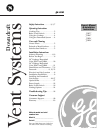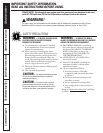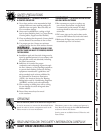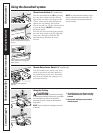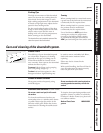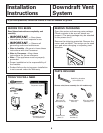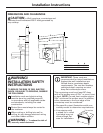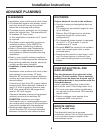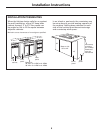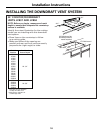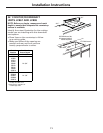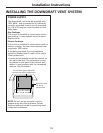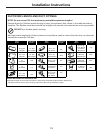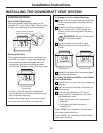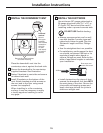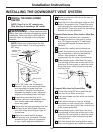
Operating Instructions Safety InstructionsInstallation Instructions
Troubleshooting TipsConsumer Support
2
IMPORTANT SAFETY INFORMATION.
READ ALL INSTRUCTIONS BEFORE USING.
PLEASE NOTE: The downdraft vent system you have purchased was designed to be used
with GE, GE Profile and GE Profile Performance cooktops listed in this manual.
WARNING!
For your safety, the information in this manual must be followed to minimize the risk of fire or
explosion, electric shock, or to prevent property damage, personal injury, or loss of life.
SAFETY PRECAUTIONS
WARNING – TO REDUCE THE RISK OF FIRE,
ELECTRIC SHOCK OR INJURY TO PERSONS,
OBSERVE THE FOLLOWING:
A. Use this unit only in the manner intended
by the manufacturer. If you have questions,
contact the manufacturer.
B. Before servicing or cleaning unit, switch
power off at service panel and lock the service
disconnecting means to prevent power from
being switched on accidentally. When the
service disconnecting means cannot be locked,
securely fasten a prominent warning device,
such as a tag, to the service panel.
C. Do not use this unit with any solid-state speed
control device.
D. This unit must be grounded.
CAUTION – For general ventilating use only.
Do not use to exhaust hazardous or explosive
materials and vapors.
CAUTION – To reduce risk of fire and to
properly exhaust air, be sure to duct air outside.
Do not vent exhaust air into spaces within walls or
ceilings or into attics, crawl spaces or garages.
WARNING – TO REDUCE THE RISK OF
INJURY TO PERSONS IN THE EVENT OF A COOKTOP
GREASE FIRE, OBSERVE THE FOLLOWING*:
A. SMOTHER FLAMES with a close-fitting
lid, cookie sheet or metal tray, then turn off
the burner. BE CAREFUL TO PREVENT
BURNS. If the flames do not go out
immediately, EVACUATE AND CALL
THE FIRE DEPARTMENT.
B. NEVER PICK UP A FLAMING PAN—
You may be burned.
C. DO NOT USE WATER, including wet
dishcloths or towels—a violent steam
explosion will result.
D. Use an extinguisher ONLY if:
1. You know you have a Class ABC
extinguisher, and you already know how
to operate it.
2. The fire is small and contained in the
area where it started.
3. The fire department is being called.
4. You can fight the fire with your back to
an exit.
* Based on “Kitchen Fire Safety T
ips” published
by NFPA.



